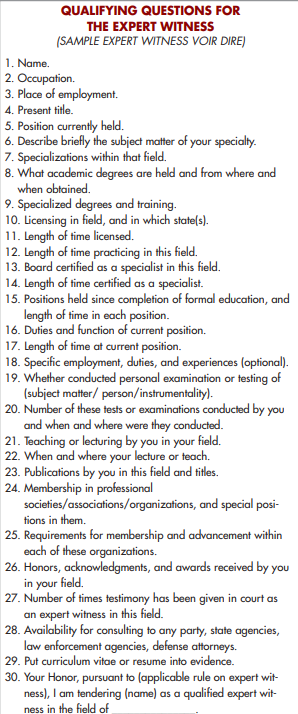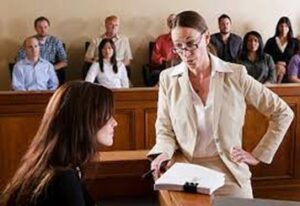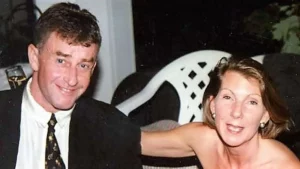April 13, 2023
Corruption in the Courtroom: An Ethical Dissection of Expert Witnesses

The United States court system relies on experienced professionals to testify and present technical information in a comprehensible manner to the everyday people who make up the jury. These people are referred to as expert witnesses or simply as experts. Only approximately ten percent of all criminal cases will ever be heard in the presence of a jury, and this is the small subsection of cases that expert witnesses are used in.1 Although the proportion of cases involving an expert witness is small, the effect they can have on each case they are a part of is immense and incredibly important, but there are flaws in the system that need to be addressed. An expert witness is a potential weak link for the spread of corruption into the courtroom, and they can have a major influence on the outcome of a trial. Expert witnesses are human and capable of deceit, leading to a possible epicenter for abuse of the system and presenting an ethical concern that calls into question the use of expert witnesses. It is ethically deplorable for expert witnesses to knowingly or unknowingly mislead a jury, especially through omission of information, misrepresentation of one’s qualifications, or presenting an opinion-based argument through the lens of high levels of education.
Expert witnesses have been present in the United States court system, in limited capacity, since as early as 1782, when they assisted lawyers in the preparation of their cases. It was not common practice, although, until the early twentieth century. In the early 1920s, a psychologist was used as an expert witness in a civil case between two soda companies to provide their opinion on the copywrite infringement of similar names. This sparked the concept of experts, not only presenting complicated information and making it intelligible to the layperson, but also injecting their educated opinion for strong consideration.2 This is an idea that would quickly become synonymous with the entire idea of expert witnesses. In the United States, the widespread admissibility of an expert opinion in the courtroom started with the opinions of medical doctors and other officials. Often offering their opinions on the cause of certain wounds these medical professionals started becoming very influential to the outcome of the case. With this development of opinions entering the courtroom it became necessary to develop a process to verify the credentials of the expert witnesses in the courtroom.3

Within the current system, there is an evaluation and qualification process to confirm the viability of an expert witness. First, the witness must be appointed and called by one of the parties in the case; this is usually one of the attorneys. A deposition, an exploratory questioning to gain as much information as possible, is the next step to affirming the status of an expert witness in each individual case. It is crucial to depose, or question, each potential expert to determine if they are able to serve as a properly qualified and effective expert witness. The bulk of the questioning falls under the title of a Voir Dire which translates from French as “to speak the truth”. This questioning is brought on by the opposite side of the case that presented the expert. For example, if the prosecution presents an expert witness to the court, the defense will provide the Voir Dire to the witness to determine the viability of the expert. The Voir Dire, which consists of approximately thirty questions, covers a number of different topics to thoroughly vet a potential expert witness. First, some general information, which will include their name, occupation, current title, and employment place. Next, they will venture into the educational history of the expert by asking about what degrees they hold and from what universities, as well as the specializations and certifications they have attained. After education, the question of employment is brought up to determine where, when, and for how long they have worked in several different positions. Additionally, it is important to find out what they worked on and if they had any publications while working. Finally, the experts will be asked about some miscellaneous topics, including their positions on councils and any other honors. After all of these questions have been asked and answered successfully, the team that performed the Voir Dire will decide if they want the witness to be admitted to the trial as an expert witness.4 The aforementioned process provides a foundation to start the process, though it also contains weaknesses that could lead to unethical behavior.
The deficiency in the process that is quite pressing is the potential for information to be omitted by the expert. Leaving information out of the presentation of facts paints an idealized picture that will not allow for the jury to make an informed decision. This vulnerability is not considered by the courts, and each expert witness is sworn to include all relevant information, and therein lies the major issue. Who gets to decide what is relevant? Generally, the decision is left to the expert witness to present what is relevant and leave out things that are not. This powerful ability for the expert witness to leave out information from the case is key to the possibility of an expert witness leaving out information that may be crucial for a concrete understanding of the facts.5 It is possible that an expert witness could assume that some pieces of information are not relevant and therefore leave it out of their testimony, but this should not be a common practice because of the general lack of scientific comprehension of the (generally not scientifically trained) jury members. This is why the final determination of relevance should be made and taken into consideration by the jury, not the expert.6 Withholding information from the jury in any amount is problematic for their ability to make a clear and informed decision. The manipulation of information by omission is a potentially powerful tool if used by a team of attorneys to inevitably get their client a more favorable outcome.

Although there is robust evidence to suggest that the testimony of expert witnesses is integral to the outcome of criminal trials, the ability of these experts to overrepresent and falsely over qualify themselves cannot be overlooked. This could place much more weight on their testimony in the mind of the jury than it should because of the assumed trust in the expert by way of their extensive education. These experts could be inflating their education in the eyes of the jury while not directly lying about any of their qualifications. It is often the case that experts are appointed by the court and not one side of the case. When this happens, it is possible that the experts appointed can have biases that are supported by their qualifications, or lack thereof, and provide skewed testimony in favor of one side or the other. Consistently shopping for experts whose personal beliefs align with a specific side of the case is an incredible danger to the case that could lead to convictions that are wrongful and thoroughly influenced by the expert witness that was not chosen for their abilities or qualifications but to further an already decided decision by one side of the case. Misrepresenting the intentions and the qualifications of an expert witness is a serious issue, and one that can call into question the trust of nearly all expert witnesses.7 Although initially misrepresented qualifications could be an extreme issue, the use of properly qualified experts to push strong opinions and argue them in court without enough hard evidence also raises ethical concerns.
Argumentative opinions are another alarming issue within the expert witness role in the courtroom. Everyone is entitled to their own opinions, but placing a large amount of weight on the opinion of a single person within a case could cause unjust outcomes and excess conflict for every person who stands accused within the court system. The assumption by the jury about the role of experts in the courtroom is that they are present to explain and give context in a comprehensible manner to all of the technical and likely scientific evidence that the average person cannot fully understand. This assumption is challenged when the experts begin to lean into their personal opinions on the subject matter that could be targeted to sway the jury in a desired direction. Although it is often necessary for some opinion to come into play through the testimony to bring the information full circle, it is critically important to limit this influence and keep the focus closely on the facts of the case.8 When a strong opinion enters the courtroom, it must be thoroughly backed up by several sources; if it is not, that portion of the testimony can be struck from the record but will in fact have an impact on the thought processes of each juror, whether they are informed to disregard it or not. These types of opinions may be derived in a way that has not been sufficiently backed up to the point of presentation in a court of law. Although they may not be supported by enough research, they may be eloquent enough to stick strongly in the minds of jurors, which is precisely the goal of an expert witness with malicious intent.9

These concerns have caused issues in multiple cases in the United States in the past and are a bolster for a deep dive into the root of the issues and addressing them. In 2003, during the case of State of North Carolina v. Michael Iver Peterson, an expert witness was the only evidence that pointed directly at Mr. Peterson for murdering his wife. This conviction was based on the opinion of one expert witness who assessed the blood staining at the crime scene. The strong opinion put on the record by this expert witness was the largest piece of evidence used to sentence this man to life in prison. After nearly ten years in prison, the appeals process came through and lowered the charges against Mr. Peterson after the testimony was found to be conjecture. In 2011, Mr. Peterson was released on house arrest and was eventually only reconvicted of manslaughter.10 During another case, it was found that an expert witness had exaggerated their qualifications and influenced the conviction of Clyde Green in 1926. Whether he was indeed guilty or not is unclear, but it is clear that this oversight caused this man to be convicted of manslaughter and sentenced to twenty-one years in prison. He was later pardoned because of the issue of a false expert.11 These types of issues call into question the viability of expert witnesses as a whole.
Expert witnesses continue to be an integral part of many trials in the United States, but there seem to be several undeniable issues that continue to provide ethical grey areas that cannot be ignored. The omission of information, the misrepresentation of qualifications, and the insertion of strong, unsupported opinions are three of the largest concerns within the domain of expert witnesses.
- “Criminal Cases | United States Courts.” Accessed March 11, 2023. https://www.uscourts.gov/about-federal-courts/types-cases/criminal-cases. ↵
- J.D, Dani Alexis Ryskamp. “A Brief History of Expert Witnesses in U.S. Courts.” Expert Institute, May 10, 2018. https://www.expertinstitute.com/resources/insights/a-brief-history-of-expert-witnesses-in-u-s-courts/. ↵
- Milroy, Christopher M. “A Brief History of the Expert Witness.” Academic Forensic Pathology 7, no. 4 (December 2017): 516–26. https://doi.org/10.23907/2017.044. ↵
- Sapir, Gil. Legal Aspects of Forensic Science. 2nd ed. Vol. 1. Prentice-Hall, 2002. https://www.chm.uri.edu/forensics/courses/Appendix%20-%20forensic%20science%20&%20expert%20witness/Voir%20Dire.pdf. ↵
- Ronquillo, Yasmyne, Kenneth J. Robinson, and Patricia P. Nouhan. “Expert Witness.” In StatPearls. Treasure Island (FL): StatPearls Publishing, 2022. http://www.ncbi.nlm.nih.gov/books/NBK436001/. ↵
- “Scientific Evidence in Criminal Cases | Fort Lauderdale Crime Defense Lawyer.” Accessed March 12, 2023. https://www.ralphbehr.net/scientific-evidence-in-criminal-cases.html#:~:text=Judges%20serve%20the%20jury%20system,the%20%E2%80%9Ctasks%20at%20hand.%E2%80%9D. ↵
- Thompson, Simon. “Misrepresentation of Expert Witness Testimony Explained by Situational Action Theory.” Journal of Law and Criminal Justice 10, no. 1 (June 2022): 14–28. http://jlcjnet.com/journals/jlcj/Vol_10_No_1_June_2022/2.pdf. ↵
- Boyd, Kenneth. “Trusting Scientific Experts in an Online World.” Synthese 200, no. 1 (February 2022): 14. https://doi.org/10.1007/s11229-022-03592-3. ↵
- Babitsky, Alex. “How to Avoid Exclusion of Your Expert Witness Opinions.” Expert Witnesses Training (blog), August 26, 2019. https://www.testifyingtraining.com/how-to-avoid-exclusion-of-your-expert-witness-opinions/. ↵
- vLex. “State v. Peterson, No. COA05-973.” Accessed March 12, 2023. https://case-law.vlex.com/vid/state-v-peterson-no-894763118. ↵
- “Green v. Commonwealth, 309 S.W.2d 178 | Casetext Search + Citator.” Accessed March 12, 2023. https://casetext.com/case/green-v-commonwealth-8. ↵
Tags from the story
Nomination-Social-Sciences
Recent Comments
Vincent Villanueva
Christopher, I believe you did a great job in stating your opinion and the structure of the article is very well done. I knew the basics of the courtroom procedures but reading this and seeing your graphics with you going into depth helps me understand the situation a lot more in the way that things can possibly get messy and overall, misconstrued.
25/04/2023
2:18 pm
Alexander Garcia
First and foremost I would like to applaud you on this very well written article because it was truly an amazing read. Not only did you provide good points, but you also provided very good examples that overall helped you points even more. As someone who is a member of the mock trial team, and wants to pursue a career in law I really found this article fascinating because it made me look at expert witnesses differently. I never realized how much of a threat they could pose but after reading your article I am pleased to say that I understand this issue way more.
27/04/2023
2:18 pm
Hunter Stiles
I am always shocked by how much consideration and effort goes into a profession such as this. I think you did a terrific job of expressing your viewpoint, and the article’s structure is excellent. Although I was familiar with the fundamentals of courtroom protocol, reading this and viewing your detailed illustrations has greatly improved my comprehension of the scenario and the potential for confusion and miscommunication. Very well done!
27/04/2023
2:18 pm
Karah Renfroe
I found this article to be very well-written and interesting. I am planning to attend law school this upcoming fall so this topic hits close to home for me and my future career plans. I have always had an interest in this topic, but have not heard much discourse on it so I greatly appreciated the exploration here. I know that testimony has been proven to be unreliable in many cases, however this is often not realized by the jury or general public. I believe one of the best pieces that has touched on this topic in the last several years was the documentary, “Making a Murder.” I would check this out if you have not already for more info on this and how its affects in a pressing case!
28/04/2023
2:18 pm
Peter Alva
I love this article and it’s because this is something I have been waiting to read about. The way you talk about this shows me that youre so passionate about the law. Not knowing so much about what you were gonna talk about, when I finished reading I felt informed and had a real understanding of what you were talking about and was able to picture it in my head well.
28/04/2023
2:18 pm
Maximillian Morise
This is a very intriguing article because it goes into an issue regarding the American court system that has continued to plague it. Witnesses, while they should be able to testify, cannot always be believed 100%, even if they are the victims of a crime. Often times they will find themselves exaggerating or misremembering crucial details of an issue at hand, which can prove severely detrimental to the case as a whole. I congratulate the author for their article and their nomination!
30/04/2023
2:18 pm
Karicia Gallegos
Congratulations on your nomination! I am planning on going to law school in the future so this is one of the most interesting article that I’ve read. The use of expert witnesses in the United States court system is essential to providing juries with technical information in a comprehensible manner. However, the potential for corruption and unethical behavior by expert witnesses is a significant concern. I had never really put much thought into that before but it is something that can easily happen. Ultimately, the manipulation of information by omission is a potentially powerful tool if used by a team of attorneys to get their client a more favorable outcome, which is an ethical concern that calls into question the use of expert witnesses in the courtroom. Overall great job!!
02/05/2023
2:18 pm
Joseph Frausto
Mr. Towle, This right here is an impressive article. Very well written and gripping from start to finish, this article masterfully weaves accounts of expert testimony gone awry into a cautionary tale on a very corrupt and yet normalized practice in our judicial system. I am impressed at the skillfulness of the writing and congratulate you on your writing.
11/05/2023
2:18 pm

Natalia Bustamante
Hello, Christopher! I am really glad that you choose to write about this topic because it has definitely been getting out of hand. As a person who is interested in pursuing law in the future, it is very important to me that justice is achieved ethically and legally. I am very impressed with the citations you made to cases. That really just furthered your point and provided the audience with the necessary sources. Overall, such an important topic, and really enjoyed how you executed the information in the article.
24/04/2023
2:18 pm